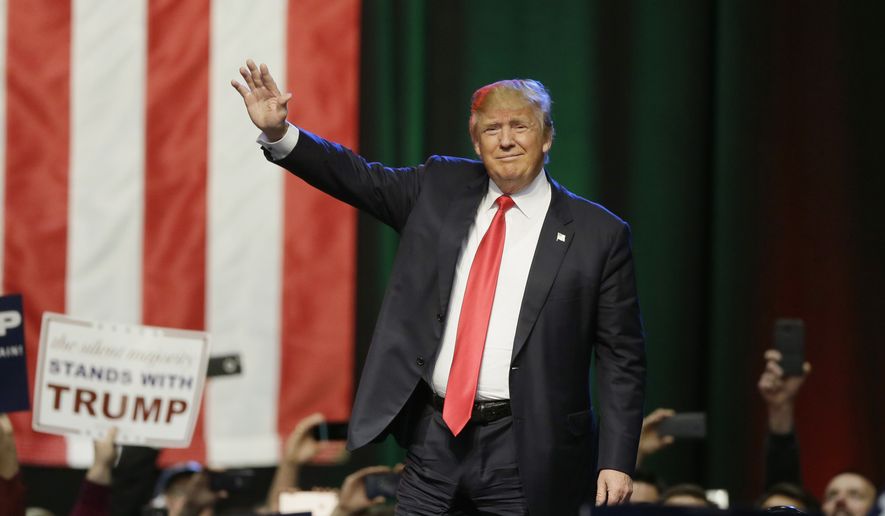GOP presidential front-runner Donald Trump has a solid grip on New Hampshire in the 2016 Republican primary contest, but a good chunk of GOP voters in the state would opt for other choices in a general election if former New York City Mayor Michael Bloomberg entered the race, according to a poll released Thursday.
Mr. Trump was at 27 percent support in the Suffolk University poll of likely GOP primary voters in New Hampshire — well ahead of Sen. Ted Cruz of Texas and Ohio Gov. John Kasich, who were tied for second at 12 percent each.
Former Florida Gov. Jeb Bush was next at 11 percent, followed by Sen. Marco Rubio at 10 percent, and with no other candidate above 6 percent.
“More than a quarter of New Hampshire’s GOP voters are loyal to Donald Trump,” said David Paleologos, director of the Suffolk University Political Research Center in Boston. “That 27 percent isn’t a skyscraper, but it towers over the four candidates vying for second place.”
Mr. Trump picked up 5 points of support since a Suffolk poll released in November, and Mr. Bush, Mr. Cruz, and Mr. Kasich picked up 3 points each.
New Jersey Gov. Chris Christie, who was at 6 percent, gained 2 points, while retired neurosurgeon Ben Carson dropped 5 points, to 5 percent.
Mr. Paleologos said a surprise win from a second-tier candidate in Iowa could create enough momentum to break into the 20 percent range in New Hampshire.
“If there are no surprises in Iowa, the undecided voters will be divided, and Trump will prevail,” he said.
Mr. Trump led when likely voters were asked which of the top seven GOP candidates had the best chance of winning the general election in November, getting 41 percent to 13 percent for Mr. Cruz, the next closest.
But the poll also showed that Mr. Trump wouldn’t necessarily unify Granite State Republicans come November.
In a three-way contest between Mr. Trump, former Secretary of State Hillary Clinton as the Democratic nominee and former New York City Mayor Michael Bloomberg as an independent, 63 percent of GOP voters said they would back Mr. Trump, 10 percent said they would vote for Mrs. Clinton, and 10 percent said they would vote for Mr. Bloomberg. Three percent said they wouldn’t vote and 14 percent were undecided.
With Sen. Bernard Sanders of Vermont in the mix, 57 percent of Republicans said they would support Mr. Trump, 18 percent said they would support Mr. Sanders, and 9 percent said they would support Mr. Bloomberg. Three percent said they would not vote, and 13 percent were undecided.
“A Trump nomination coupled with independent Michael Bloomberg’s possible entrance into the fray signals a seismic shift in the Republican landscape,” Mr. Paleologos said. “Not only would a Trump nomination lose votes to the Democrat and independent candidates, it would suppress Republican turnout, at least in New Hampshire. This is the place where Trump’s negatives are quantifiable.”
“If you are the GOP, you can’t afford to lose a quarter of the vote from among the best Republican primary voters,” Mr. Paleologos said.
• David Sherfinski can be reached at dsherfinski@washingtontimes.com.




Please read our comment policy before commenting.